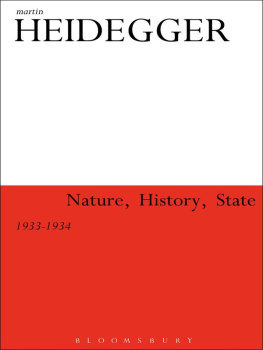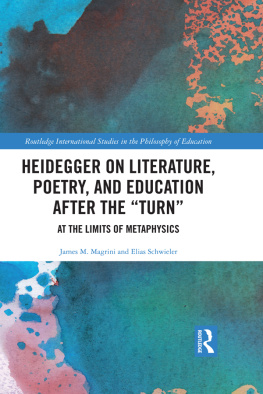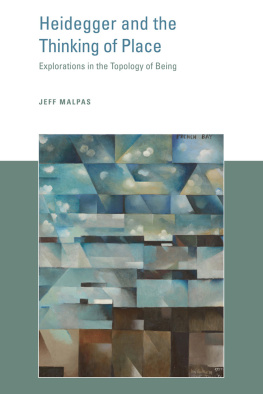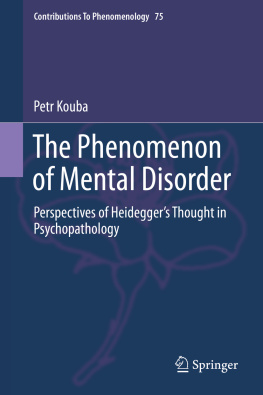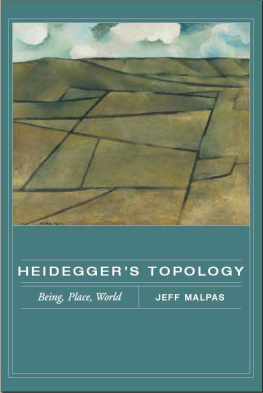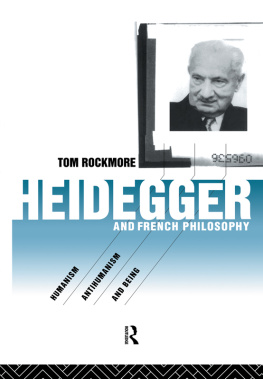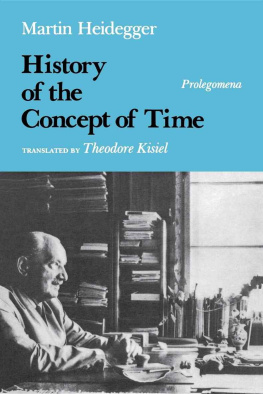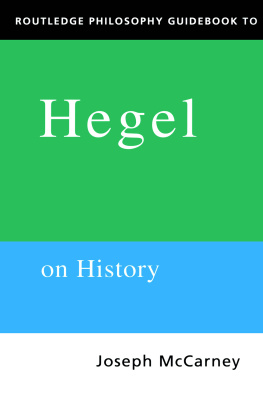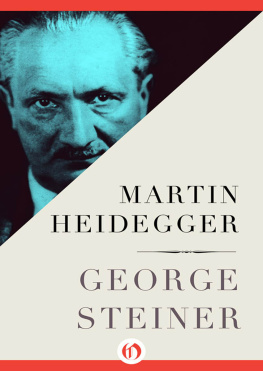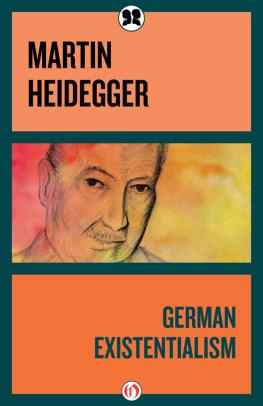Heidegger Martin - Nature, History, State_ 1933-34
Here you can read online Heidegger Martin - Nature, History, State_ 1933-34 full text of the book (entire story) in english for free. Download pdf and epub, get meaning, cover and reviews about this ebook. year: 2013, publisher: Bloomsbury Publishing, genre: Religion. Description of the work, (preface) as well as reviews are available. Best literature library LitArk.com created for fans of good reading and offers a wide selection of genres:
Romance novel
Science fiction
Adventure
Detective
Science
History
Home and family
Prose
Art
Politics
Computer
Non-fiction
Religion
Business
Children
Humor
Choose a favorite category and find really read worthwhile books. Enjoy immersion in the world of imagination, feel the emotions of the characters or learn something new for yourself, make an fascinating discovery.
- Book:Nature, History, State_ 1933-34
- Author:
- Publisher:Bloomsbury Publishing
- Genre:
- Year:2013
- Rating:3 / 5
- Favourites:Add to favourites
- Your mark:
- 60
- 1
- 2
- 3
- 4
- 5
Nature, History, State_ 1933-34: summary, description and annotation
We offer to read an annotation, description, summary or preface (depends on what the author of the book "Nature, History, State_ 1933-34" wrote himself). If you haven't found the necessary information about the book — write in the comments, we will try to find it.
Nature, History, State_ 1933-34 — read online for free the complete book (whole text) full work
Below is the text of the book, divided by pages. System saving the place of the last page read, allows you to conveniently read the book "Nature, History, State_ 1933-34" online for free, without having to search again every time where you left off. Put a bookmark, and you can go to the page where you finished reading at any time.
Font size:
Interval:
Bookmark:
ALSO AVAILABLE FROM BLOOMSBURY
Basic Problems of Phenomenology, Martin Heidegger
The Concept of Time, Martin Heidegger
The Essence of Human Freedom, Martin Heidegger
The Essence of Truth, Martin Heidegger
Mindfulness, Martin Heidegger
Phenomenology of Intuition and Expression, Martin Heidegger
Towards the Definition of Philosophy, Martin Heidegger
NATURE, HISTORY, STATE
19331934
Martin Heidegger
Translated and edited by
Gregory Fried and Richard Polt
With essays by Robert Bernasconi, Peter E. Gordon, Marion Heinz, Theodore Kisiel, and Slavoj iek
Athlone Contemporary European Thinkers

Bloomsbury Academic
An imprint of Bloomsbury Publishing Plc
50 Bedford Square London WC1B 3DP UK
1385 Broadway New York NY 10018 USA
www.bloomsbury.com
Bloomsbury is a registered trade mark of Bloomsbury Publishing Plc
ber Wesen und Begriff von Natur, Geschichte und Staat. bung aus dem Wintersemester 1933/34 (pp. 5388) taken from Heidegger-Jahrbuch 4 Heidegger und der Nationalsozialismus I, Dokumente edited by Alfred Denker and Holger Zaborowski 2009 Verlag Karl Alber part of Verlag Herder GmbH, Freiburg im Breisgau
Marion Heinz, Volk und Fhrer. Untersuchungen zu Heideggers Seminar ber Wesen und Begriff von Natur, Geschichte und Staat (1933/34) (pp. 5575) taken from Heidegger-Jahrbuch 5 Heidegger und der Nationalsozialismus II, Interpretationen edited by Alfred Denker and Holger Zaborowski 2010 Verlag Karl Alber part of Verlag Herder GmbH, Freiburg im Breisgau
Heidegger in the Foursome of Struggle, Historicity, Will, and Gelassenheit adapted from Slavoj iek, Less Than Nothing (London: Verso, 2012), pp. 878903. Reproduced with permission from Verso.
This English translation and editorial material
Gregory Fried and Richard Polt, 2013
Individual Essays Contributors, 2013
All rights reserved. No part of this publication may be reproduced or transmitted in any form or by any means, electronic or mechanical, including photocopying, recording, or any information storage or retrieval system, without prior permission in writing from the publishers.
No responsibility for loss caused to any individual or organization acting on or refraining from action as a result of the material in this publication can be accepted by Bloomsbury Academic or the author.
British Library Cataloguing-in-Publication Data
A catalogue record for this book is available from the British Library.
eISBN: 978-1-4411-3325-0
Library of Congress Cataloging-in-Publication Data
A catalogue record for this book is available from the Library of Congress.
CONTENTS
Marion Heinz
Peter E. Gordon
Robert Bernasconi
Theodore Kisiel
Slavoj iek
Gregory Fried (Suffolk University) is the author of Heideggers Polemos: From Being to Politics and (with Charles Fried) Because It Is Wrong: Torture, Privacy and Presidential Power in the Age of Terror.
Richard Polt (Xavier University, Cincinnati) is the author of Heidegger: An Introduction and The Emergency of Being: On Heideggers Contributions to Philosophy. Together, Fried and Polt have translated Heideggers Introduction to Metaphysics and Being and Truth and edited A Companion to Heideggers Introduction to Metaphysics.
Robert Bernasconi is Edwin Erle Sparks Professor of Philosophy at Pennsylvania State University. He is the author of The Question of Language in Heideggers History of Being, Heidegger in Question: The Art of Existing, and How to Read Sartre. The topics of his published essays include Kant, Hegel, Levinas, and critical philosophy of race.
Peter E. Gordon is Amabel B. James Professor of History at the Center for European Studies at Harvard University. His books include Rosenzweig and Heidegger: Between Judaism and German Philosophy and Continental Divide: Heidegger, Cassirer, Davos. He has also co-edited several books, including The Cambridge Companion to Modern Jewish Philosophy, Weimar Thought: A Contested Legacy, and The Modernist Imagination.
Marion Heinz (Universitt Siegen) is the author of Zeitlichkeit und Temporalitt: die Konstitution der Existenz und die Grundlegung einer temporalen Ontologie im Frhwerk Martin Heideggers and Sensualistischer Idealismus: Untersuchungen zur Erkenntnistheorie des jungen Herder (17631778). She is the editor of volume 44 of the Heidegger Gesamtausgabe and has also edited and co-edited a variety of volumes on German philosophy, feminism, and gender theory.
Theodore Kisiel (Northern Illinois University) is the author of The Genesis of Heideggers Being and Time and Heideggers Way of Thought: Criticaland Interpretive Signposts. He has translated Heideggers History of the Concept of Time and published numerous articles on Heidegger.
Slavoj iek (University of Ljubljana) is the author of books on topics including Lacan, Marxism, and contemporary culture, including The Sublime Object of Ideology, In Defense of Lost Causes, The Parallax View, Living in the End Times, Less Than Nothing, and The Year of Dreaming Dangerously.
Richard Polt and Gregory Fried
Martin Heideggers support for the Nazi regime has long been a matter of public knowledge, but only recently have we gained a clearer picture of the details of his political activities and positions. Together with other documents from Heideggers tenure as the first National Socialist rector of the University of Freiburg in 19334, the seminar in this volume is an essential piece of evidence for those who wish to assess the degree to which he was intellectually committed to Nazi ideology. In the light of this text, Heideggers postwar attempts to minimize the extent of his support for Nazism are no longer credible, and any interpretation that makes a simple distinction between his philosophy and his politics is no longer tenablefor in this seminar, Heidegger sketches a political philosophy, consistent with his views on the historicity of Dasein or human existence, that explicitly supports Hitlerian dictatorship and suggests justifications for German expansionism and persecution of the Jews.
This is not to say that the text necessarily renders Heideggers thought as a whole bankrupt. We still must ask whether we can disentangle the truer or more promising aspects of his philosophy from the pernicious ones. We still must try to diagnose the errors in Heideggers views and understand the merely ideological or culturally conditioned elements in them, while remaining open to the possibility that they can provide insights that transcend the dark circumstances of this seminar. We still must judge this text in the larger context of Heideggers thought. The five essays by leading thinkers and scholars in this volume take up these philosophical challenges, offering us distinctive ways to read the seminar from appropriately critical, yet not dismissive perspectives.
The seminar
Heidegger held his seminar On the Essence and Concept of Nature, History, and State in ten sessions from November 3, 1933 to February 23, 1934. We do not have Heideggers own notes or text for the seminar, if such existed; instead, the text consists of student protocols or reports on the seminar sessions. These protocols were reviewed by Heidegger himself, as confirmed by two interpolations he makes in the text. The protocols also generally sound like Heidegger; readers familiar with his lecture courses will recognize typical trains of thought and turns of phrase. The first protocol provides one students perspective on the discussions that took place during the opening session of the seminar; it is valuable as a glimpse of the atmosphere in Heideggers classroom and his practice as a teacher. To judge from the remaining protocols, the subsequent nine sessions must have proceeded more like a lecture course, for only Heideggers voice is present, and he develops a fairly continuous line of argument. Thus, while we cannot rely on this text as a verbatim transcript of what Heidegger said, it is reasonable to take it as good evidence of the essential content of the views he developed during this seminar.
Next pageFont size:
Interval:
Bookmark:
Similar books «Nature, History, State_ 1933-34»
Look at similar books to Nature, History, State_ 1933-34. We have selected literature similar in name and meaning in the hope of providing readers with more options to find new, interesting, not yet read works.
Discussion, reviews of the book Nature, History, State_ 1933-34 and just readers' own opinions. Leave your comments, write what you think about the work, its meaning or the main characters. Specify what exactly you liked and what you didn't like, and why you think so.

